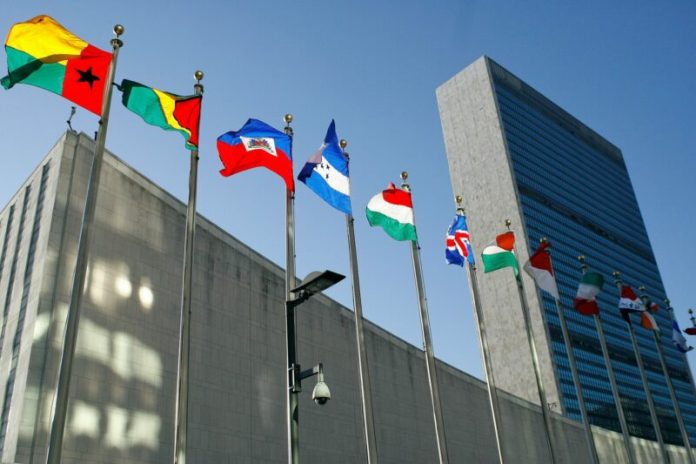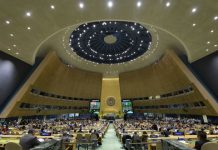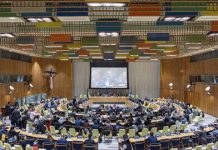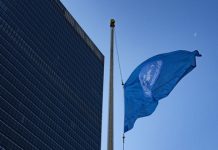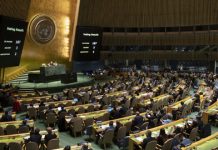Gaza: UN chief welcomes Security Council resolution to end conflict
As UN Secretary-General António Guterres welcomed Monday’s Security Council resolution that paves the way for a temporary International Stabilization Force in Gaza, UN aid teams warned that many Palestinian children in the enclave are in no shape to endure another harsh winter.
More than two years of destructive war between Hamas fighters and Israel and a chronic lack of all forms of assistance have left the enclave’s people exhausted and sick, aid teams warned in an update on Tuesday.
In recent days, flooding has inundated worn-out tents that are sheltering people displaced multiple times because of the war, said Ricardo Pires, from the UN Children’s Fund, UNICEF:
“We are seeing heartbreaking stories of desperate families feeling completely lost and exhausted after their tents got flooded. Most of them have been displaced multiple times and lost everything in the past two years their possessions, their homes, loved ones. When children are sleeping in flooded tents without warm clothing or dry bedding, many lacking the required nutrition, with very low immunity and already traumatized by conflict, winter becomes extremely dangerous.”
Mr. Pires noted that the recent bad weather in Gaza has sparked an increase in people seeking medical help – particularly among children whose immunity is low “after years of malnutrition, starvation, trauma (and) multiple displacements”.
He explained that because Israeli forces occupy more than 50 per cent of the enclave, many of the areas where Palestinians have been forced to seek shelter are coastal and the most prone to flooding.
Lack of funding leaves UN food agency ‘taking from the hungry to feed the starving’
International support for the world’s hungriest people is “slow, fragmented and underfunded”, meaning that many living in the world’s trouble-spots will likely be unable to receive sufficient help next year.
That’s the stark message from the UN World Food Programme (WFP), which warned that several countries already facing extreme food insecurity could see conditions get even worse, without an urgent injection of funds.
They include Sudan, the Occupied Palestinian Territories, South Sudan, Haiti, Mali and Yemen.
The agency is also deeply concerned about rising hunger in Afghanistan, the Democratic Republic of the Congo, Myanmar, Nigeria, Somalia and Syria.
To help, it is appealing for $13 billion for 110 million of the world’s most vulnerable people next year, said Jean-Martin Bauer, Director of WFP’s Food Security and Nutrition Analysis Service:
“Now the appeal for 2026 is smaller; it’s smaller not because of reduced need. In fact, the needs are still very high. They’re still very, very concerning, but we’ve reduced the need to be as realistic as possible and we’ve prioritised the most vulnerable in what we do. And these are very difficult decisions. In some cases, it’s really taking from the hungry to feed the starving. We shouldn’t be in that position at all.”
Globally, WFP says that 318 million people will face “crisis levels of hunger or worse next year”. That is more than double the figure recorded in 2019.
The agency insists that its work “pulled several communities back from the brink of starvation” this year, but the global food crisis shows no signs of abating in 2026 as conflict, extreme weather events, and economic instability continue to drive severe hunger.
Lebanon: Blue Line ceasefire violations threaten regional peace, says UN force
To Lebanon, where the UN peacekeeping force there, UNIFIL, has released new details about the Israeli tank fire incident involving a group of peacekeepers on patrol last Sunday.
The live fire incident happened near what is known as the Blue Line of demarcation separating Israel from Southern Lebanon.
The Israel Defense Forces blamed “misidentification”.
According to UNIFIL, shots hit the ground about five metres away from its patrol, which was unharmed. Both the Lebanese and Israeli authorities had been informed about the reconnaissance mission, said force Deputy Spokesperson, Kandice Ardiel.
She told UN News that since last November, the Israeli military has taken about 10 square kilometres of Lebanese territory in five positions and two buffer zones, preventing the Lebanese people and the Lebanese army from entering.
“Unfortunately, the IDF has ensured that people cannot come back to these villages that are near their five positions and two buffer zones, and it means people are afraid, because they don’t know what’s going to happen. People who are approaching these areas and in other areas have been subject to warning fire. All of farmers who are harvesting their crops have had drones, have had grenades dropped nearby. So, it means that people are not able to return to their livelihoods, return to their normal lives.”
UNIFIL recently identified a high concrete wall being built along the Blue Line which it maintains crosses into Lebanese territory in two places.
The UN force insists that this is a violation of the line which peacekeepers monitor every day.
Daniel Johnson, UN News
Source of original article: United Nations (news.un.org). Photo credit: UN. The content of this article does not necessarily reflect the views or opinion of Global Diaspora News (www.globaldiasporanews.com).
To submit your press release: (https://www.globaldiasporanews.com/pr).
To advertise on Global Diaspora News: (www.globaldiasporanews.com/ads).
Sign up to Global Diaspora News newsletter (https://www.globaldiasporanews.com/newsletter/) to start receiving updates and opportunities directly in your email inbox for free.


